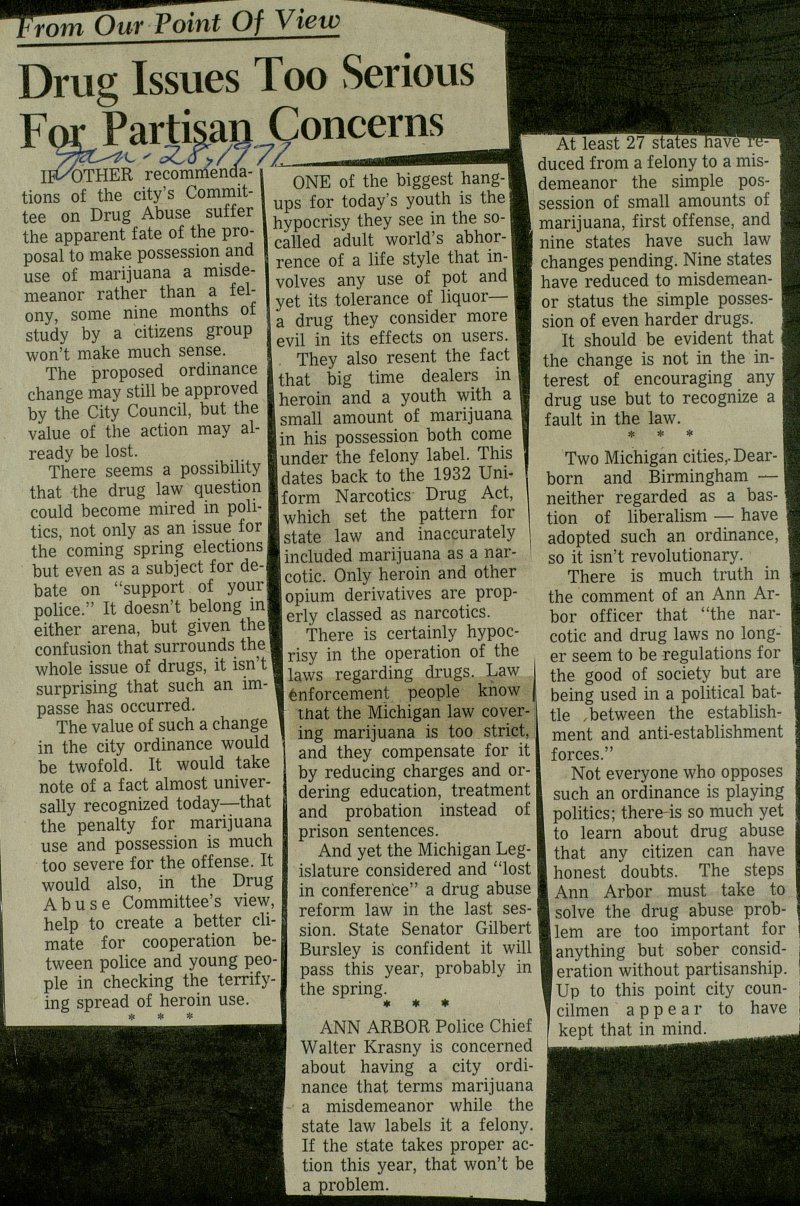Drug Issues Too Serious For Partisan Concerns

If OTHER recommendations of the city's committee on Drug Abuse suffer the apparent fate of the proposal to make possession and use of marijuana a misdemeanor rather than a felony, some nine months of study by a citizens group won't make much sense. The proposed ordinance change may still be approved by the City Council, but the value of the action may already be lost. There seems a possibility that the drug law question could become mired in politics, not only as an issue for the coming spring elections but even as a subject for debate on "support of your police." It doesn't belong in either arena, but given the confusion that surrounds the whole issue of drugs, it isn't surprising that such an impasse has occurred. The value of such a change in the city ordinance would be twofold. It would take note of a fact almost universally recognized today - that the penalty for marijuana use and possession is much too severe for the offense. It would also, in the Drug Abuse Committee's view, help to create a better climate for cooperation between police and young people in checking the terrifying spread of heroin use. ONE of the biggest hang-ups for today's youth is the hypocrisy they see in the so-called adult world's abhorrence of a life style that involves any use of pot and yet its tolerance of liquor- a drug they consider more evil in its effects on users. They also resent the fact that big time dealers in heroin and a youth with a small amount of marijuana in his possession both come under the felony label. This dates back to the 1932 Uniform Narcotics Drug Act, which set the pattern for state law and inaccurately included marijuana as a narcotic. Only heroin and other opium derivatives are properly classed as narcotics. There is certainly hypocrisy in the operation of the laws regarding drugs. Law enforcement people know that the Michigan law covering marijuana is too strict, and they compensate for it by reducing charges and ordering education, treatment and probation instead of prison sentences. And yet the Michigan Legislature considered and "lost in conference" a drug abuse reform law in the last session. State Senator Gilbert Bursley is confident it will pass this year, probably in the spring. ANN ARBOR Police Chief Walter Krasny is concerned about having a city ordinance that terms marijuana a misdemeanor white the state law labels it a felony. If the state takes proper action this year, that won't be a problem. At least 27 states have reduced from a felony to a misdemeanor the simple possession of small amounts of marijuana, first offense, and nine states have such law changes pending. Nine states have reduced to misdemeanor status the simple possession of even harder drugs. It should be evident that the change is not in the interest of encouraging any drug use but to recognize a fault in the law. Two Michigan cities - Dearborn and Birmingham - neither regarded as a bastion of liberalism - have adopted such an ordinance, so it isn't revolutionary. There is much truth in the comment of an Ann Arbor officer that "the narcotic and drug laws no longer seem to be regulations for the good of society but are being used in a political battle between the establishment and anti-establishment forces." Not everyone who opposes such an ordinance is playing politics; there-is so much yet to learn about drug abuse that any citizen can have honest doubts. The steps Ann Arbor must take to solve the drug abuse problem are too important for anything but sober consideration without partisanship. Up to this point city councilmen appear to have kept that in mind.